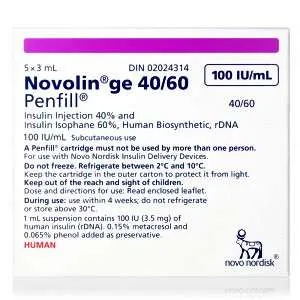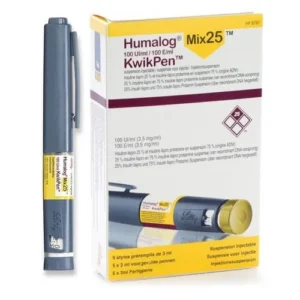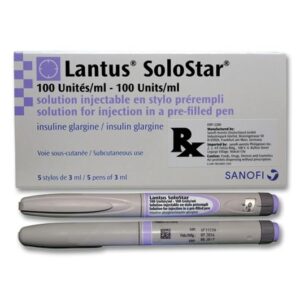Novolin GE 40/60 is premixed insulin that contains a combination of intermediate-acting insulin (insulin NPH) and fast-acting insulin (insulin regular).
Insulin is a hormone that is naturally produced in our body. The pancreas, which is an organ located behind our stomach, is the primary source of insulin. Islets, which are clusters of cells in the pancreas, produce the insulin hormone based on glucose levels in our body.
For those with diabetes, their body does not produce the required insulin or use it efficiently. As a result, glucose isn’t stored properly and builds up in the bloodstream. People with diabetes typically need to inject insulin under the skin (subcutaneously) to help manage or lower blood sugar levels.
Novolin GE 40/60 premixed insulin starts working between 30-60 minutes after injection, has its maximum effect between 2-8 hours, and stops working after 18-24 hours.
Several types of insulin medication produce different results when taken. The absorption rate and duration may vary.
Your doctor may have prescribed this medication for reasons included in this article. Speak to your doctor if you are unsure why you have been prescribed this medication. Do not stop taking prescription medication without consulting with your doctor first.
Novolin GE 40/60 is often used by those who have their blood glucose levels under control and have found this ratio of intermediate-acting and short-acting insulin works best for them.
Your prescription medication should not be shared with others even though they may share the same symptoms. Your medication is prescribed based on your individual needs. Sharing it with others may be harmful.
Warnings and Precautions
Consolidate with your doctor before using any insulin. Do not use Insulin if it appears unusually thick, sticks to the bottle looks grainy or lumpy, or seems to be discolored.
Do not use premixed Insulin if it appears to contain crystals, looks frosted, or if the suspension remains clear after rolling between your hands.
This Insulin should not be taken by anyone who is allergic to any of the ingredients in this medication, is currently experiencing a diabetic coma, or has low blood glucose levels (hypoglycemia).
Before taking this medication, be sure to inform your doctor of any allergies or existing medical conditions you may have, if you are pregnant, breastfeeding, planning on getting expectant or essential facts about your health. These factors may affect the dosage and how it should be taken.
Ensure you are taking the proper insulin, as many insulins can be vary similar, such as Humalog and Humulin.
Usage
Your doctor will base your insulin dosage on several factors, including how much insulin your body produces, lifestyle, other medications you are currently taking, and glucose levels. Your glucose levels should be monitored regularly, and results should be shared with your doctor.
Your doctor or diabetes instructor will show you how to administer your insulin dosage, which should be injected under the skin.
Do not inject premixed insulin into a muscle or vein, and do not use insulin with an infusion pump.
Insulin dosing schedules may vary; however, premixed insulin is typically injected 30 minutes before breakfast or dinner.
For application, mix Novolin GE 40/60 premixed insulin by slowly rolling the bottle between your hands. Premixed insulin suspension should appear white and cloudy.
Many factors can affect your insulin dosages, such as body weight, existing medical conditions, and other medications. Your dosage should be taken according to your doctor’s instructions, even though the information may differ online. Do not change the way you handle your insulin unless you’ve consulted with your doctor first.
Your insulin timing should be relative to your meals to keep your glucose levels under control and avoid unwanted side effects. It is essential to follow your doctor’s instructions and take the medication exactly as prescribed.
Side Effects
A side effect is an unwanted response resulting from taking medication in regular doses. As with taking any insulin medication, side effects may occur. Side effects can range from mild to severe, temporary or permanent.
Side effects are not experienced by everyone and are pretty rare. Speak to your doctor if you are concerned about any side effects or experiencing any. Also, speak to your doctor about the benefits and risks.
The side effects listed below have been reported in at least 1% of patients taking this medication. Many of the side effects go away over time and can be managed.
Consult your doctor if you experience any of the side effects, including low blood glucose levels, anxiety, blurred vision, confusion, drowsiness, dizziness, fast heartbeat, difficulty concentrating, headache, hunger, nervousness, nausea, sweating, tiredness, trembling, weakness ad numbness or tingling of fingers, lips, or tongue.
Let your doctor know if you experience any of the side effects or they become bothersome. Your doctor will be able to advise you on how to properly manage side effects such as redness, itching, or swelling at the site of injection.
If side effects are left unchecked, they may lead to more severe complications if they are not tended to, or you seek medical attention.
Stop taking this medication if you experience any signs of blisters or rash all over your body or seizures.
Symptoms of a severe allergic reaction (i.e., swelling of the throat or face, wheezing, difficulty breathing, or itchy or rashy skin)
unconsciousness
Some patients may experience side effects other than those listed above. Speak to your doctor if you experience any symptoms not listed or side effects that worry you while taking this medication.






Reviews
There are no reviews yet.